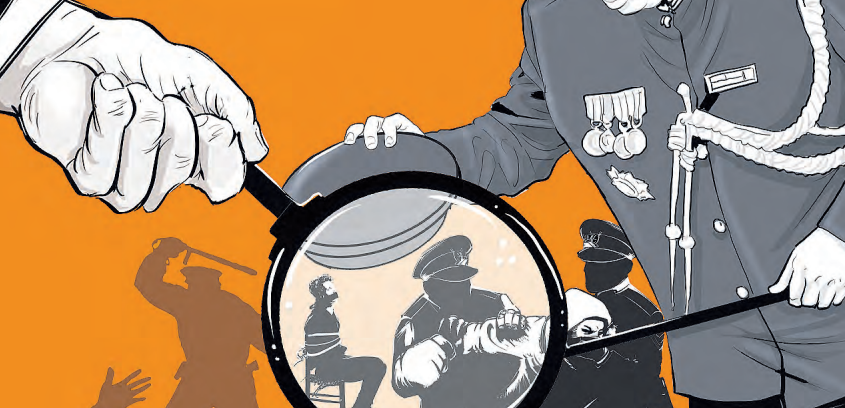
As abductions surge, with at least 82 cases since June 2024 linked to Gen Z protests, these bodies have proven impotent against their mandates, leaving citizens defenseless against a rogue National Police Service.
The IAU, meant to self-regulate the police, is a toothless relic, while IPOA, despite its grand name, is a neutered state puppet. Both have prioritised lesser investigations over the abduction crisis gripping the nation, a misstep that betrays public trust.
It’s time to disband IPOA, reform the IAU with global best practices and establish a civilian-led Police Oversight Commission to salvage accountability.
The IAU, under Section 87 of the National Police Service Act of 2011, is tasked with investigating internal police misconduct and reporting to the Inspector General.
Its mandate demands swift, impartial action against of cers abusing power—think abductions, extrajudicial killings, or brutality.
Yet, it’s a ghost in the machine —the concept of the mind existing alongside and separate from the body. Where are the IAU’s reports on the 82 abductions? Where are the disciplined of cers or public disclosures of its work?
Silence. Subordinated to the IG, who oversees the very force it’s meant to check, the IAU is a structural farce—incapable of confronting the NPS’s shadowy abductors, hooded gures in police vehicles snatching citizens.
It has not proven effective once in holding the NPS accountable on these counts, a failure laid bare by its invisibility amid Kenya’s most pressing security crisis. IPOA fares no better.
Created in 2011 to independently investigate police abuses, monitor operations and recommend prosecutions, its mandate is clear: protect Kenyans from NPS excesses.
But look at the evidence—82 abductions, 57 protest deaths, 197 injuries since June 2024, and IPOA’s response?
A pitiful 17 active probes and a January 2025 admission from chairperson Issack Hassan that it lacks capacity. With only 77 investigators out of an approved 1,300 staff, IPOA is overstretched, underfunded and outmatched.
It submits les to the DPP—19 abduction cases in 2024—but convictions are a mirage.
The NPS denies involvement, claiming hooded abductors are not theirs, and IPOA shrugs, unable to compel answers, only calling for a media address to outline its incapacity. This is not oversight; it’s resignation.
What infuriates affected citizens the most is the prioritisation of other investigations over abductions, an issue every Kenyan knows about.
Gen Z has borne the brunt—disappeared for daring to protest against the Finance Bill or criticise Ruto’s regime.
Social media buzzed with #EndAbductionsKE, yet IPOA dithers on 57 protest deaths and 197 injuries from 2023, cases that, while serious, lack the immediacy of lives vanishing daily.
The IAU, meanwhile, is nowhere to be seen—perhaps twiddling thumbs over petty of cer disputes while citizens are snatched. Why not redirect every resource to abductions, the issue screaming for action?
IPOA’s 77 investigators could focus solely on the 82 cases, roughly two per person—a manageable load—yet they juggle a broader mandate. diluting impact.
This is not strategy; it’s cowardice or incompetence. Kenyans deserve an oversight body that mirrors their urgency, not one chasing bureaucratic checklists. IPOA’s biggest sin is its name. ‘Independent’? Hardly.
As a state-funded body under the Interior ministry’s oversight, its autonomy is a lie. The ministry, led by a cabinet secretary under the presidency— implicated in abduction critiques—controls IPOA’s purse strings.
In 2024- 25, IPOA begged for Sh2.1 billion but got Sh896 million, a deliberate chokehold. This is not underfunding by accident; it’s control by design.
The same ministry defends the NPS, creating a grotesque con‑ ict where IPOA’s survival depends on the goodwill of those it is meant to police. Contrast this with the Judiciary, funded directly from the Consolidated Fund—IPOA’s tether to the Interior ministry neuters its ability to bite.
The ‘Independent’ label mocks us, a hollow promise from an entity too shackled to challenge state excesses. The IAU and IPOA are broken—ineffective and impotent against their mandates.
Unable to confront the abductions, IPOA’s faux independence and stafFIng bloat, and the IAU’s silence are indefensible.
A Police Oversight
Commission, with a reformed IAU beneath it, is the answer: independent,
resourced and accountable.











